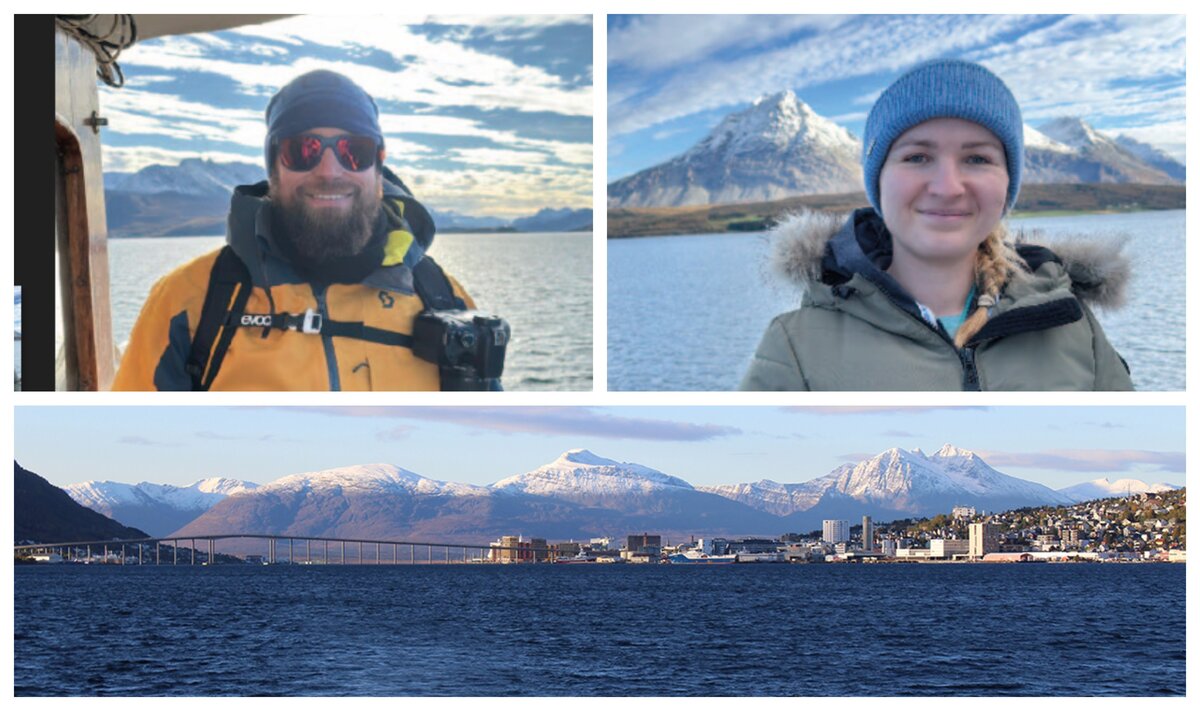Exciting research results presented at the ISSW
- 06.12.2024
- Research

Martin Schafferer and Sophia Brockschmidt at the ISSW conference excursion to the Lyngen Alp to examine practical examples of avalanche incidents and avalanche protection measures.
A team from the University of Applied Sciences Kufstein Tirol presented two current research projects at the International Snow Science Workshop (ISSW) 2024 in Tromsø, Norway. The research team presented innovative developments in avalanche research and sustainable slope optimization to an audience of 750 international experts.
The International Snow Science Workshop (ISSW) took place in Tromsø, Norway, from September 23 to 30, 2024. This established conference brings together leading scientists, practitioners and industry representatives every two years, thus promoting direct exchange between research and practice in the field of snow and avalanche science.
Sophia Brockschmidt, MSc, and Martin Schafferer, MSc, represented the FH Kufstein Tirol at the conference as research associates in the fields of industrial engineering and Smart Products & AI-driven Development, presenting current research projects.
Martin Schafferer is dedicating his dissertation in the field of mechatronics and geotechnics to the development of innovative measurement methods for recording the stratigraphy and dynamics of avalanches. Sophia Brockschmidt is leading the lighthouse project Intelligent Ski Slope and supporting the team in the development of prototypes designed to make winter sports safer and more efficient.
MEASURING SYSTEMS FOR A GOODER UNDERSTANDING OF AVALANCHES
Among other things, the research team presented the further development of existing radar systems for measuring avalanches. This innovative approach is being developed as part of Martin Schafferer's dissertation. It makes it possible for the first time to analyze the stratigraphy of the snowpack during an avalanche. The analysis of the internal structures of a moving avalanche aims to gain fundamental insights into the dynamics of avalanches. These new measurements contribute significantly to a better understanding of the complex processes involved in avalanches. In the long term, they can be used to improve simulation models and make more precise forecasts of avalanche events and their effects.
INTELLIGENT TECHNOLOGIES FOR OPTIMIZED AND SAFE SKI SLOPES
As part of a preliminary study for the Intelligent Ski Slope project funded by the state of Tyrol, a team from the Kufstein Tirol University of Applied Sciences developed an innovative IoT platform. This is used to record slope parameters. The first prototype of this measuring system has already been tested in the field. In the first step, the temperature gradient in the slope was continuously recorded with this measuring system during a one-week test phase. The temperature gradient describes the difference in temperature across different layers of the slope. This is important for monitoring snow conditions and slope stability.
In the future, sensors will be installed along the entire slope as part of the research project to continuously monitor the current slope conditions. The data obtained will enable a precise analysis of the snow and slope conditions and provide the basis for resource-efficient slope optimization. This technological innovation not only helps to improve slope quality, but also increases safety for winter sports enthusiasts.
EXCURSION TO THE LYNGEN ALPS
One of the highlights of the conference was the field trip to the Lyngen Alps. The participants reached the impressive mountain region by ship, where various avalanche events and their effects were shown and analyzed. Local experts demonstrated modern prevention measures and presented current projects for avalanche safety. “The excursion showed me how important it is to combine theory and practice in this field of research. In particular, our working group Alpine-IoT aims to increasingly explore and practically test the transferability of digital technologies to the sensitive Alpine region in the future,” said Sophia Brockschmidt about the excursion. Martin Schafferer concludes by sharing his impressions of the trip: ”The professional and international exchange is inspiring and shows that we are at the cutting edge with our topics. Smart technologies can achieve a lot, and we want to be at the forefront of that.”
Links:
- Intelligent Ski Slope | Research project
- ISSW 2024 | Information Website
